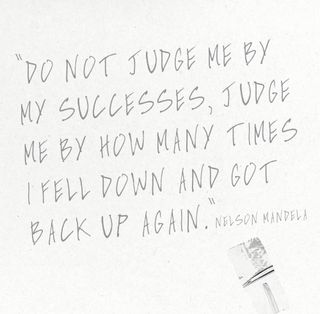Failure might be the key to success - a top psychologist unpacks why
As cover star Zoe Saldana shares that one of her biggest motivators is failure, we unpack the psychology behind it.

Nelson Mandela once said: “Do not judge me by my successes, judge me by how many times I fell down and got back up again.” A simple premise that has been around for as long as humans have existed - that to succeed, you must first fail.
Our latest Marie Claire UK cover star and Avatar actress Zoe Saldana shared in her cover interview that one of her biggest motivators is failure - the desire to prove that she can, and she will, inspires her to become a better version of herself every day.
She’s not alone - we’ve watched globally renowned athletes do exactly the same, succeeding after setbacks. England footballer Alessio Russo missed what appeared to be a relatively easy shot playing Sweden in the Euros last year, only to score an unforgettable backheeled goal. Dina Asher-Smith is the fastest British woman ever, yet has seen her fair share of frustration - she limped out of the European 100m final in August last year only to scoop silver in the European Championships 200m. And American gymnast Simone Biles walked away from the World Championships in 2018 with four gold medals (six in total) after being hospitalised shortly before with a kidney stone.
So why, as humans, is failure such a driving force and is there any truth in the theory that it can be key to success?
Let’s look at the research first. One 2019 paper, conducted by Northwestern University and published in the Nature journal, analysed nearly 800,000 grant applications submitted to the National Institute of Health between the years 1985 to 2015. The findings? That failure is “the essential prerequisite for success,” and that every winner begins as a loser.
That said, not everyone who fails will use it as motivation for success - far from it. So is it persistence, determination, or sheer stubbornness that differentiates those that fail and get back up again from those that, well, don’t? According to the research, no - rather, it’s learning from past mistakes and using those learnings to move forwards that’s really key. “You have to figure out what worked and what didn’t, and then focus on what needs to be improved instead of changing everything,” says Dashun Wang, co-author of the study and Associate Professor at Northwestern. “The people who failed didn’t necessarily work less [than those who succeeded]. They could actually have worked more; it’s just that they made more unnecessary changes.”
Keen to read more about the psychology of failure and why, exactly, it can motivate humans towards self-improvement and success? Here, we pick the brains of one of America's most sought-after psychologists, Dr. Jennifer Guttman.
Marie Claire Newsletter
Celebrity news, beauty, fashion advice, and fascinating features, delivered straight to your inbox!

Is failure key to success? We ask a top psychologist
First things first, it’s important to define what we mean by failure. According to Guttman, it can be largely understood as a situation in which you feel you haven’t succeeded at meeting your expectations or accomplishing a goal - anything from breaking dry January to failing to train for a marathon.
Failure will look different to each and every individual as we all have different life goals, hopes, and dreams.
So, what is it about failure that is often seen as a prerequisite for success? Good question.
“Failure helps motivate us to improve our skill sets in order to increase the likelihood of future success,” explains Guttman. Not only that, but she goes on to add that failure also helps build resilience so that we bounce back more effectively. “Failure can help you bounce back with increased positivity and strength of purpose, and help us embrace and cherish the successes we have had more fully.”
Think of it this way - if you don’t hit a target at work, you’ll likely have to take the time to assess what went wrong and work out how not to make the same mistakes in future.
So what is it about failure, psychologically speaking, that motivates us as humans? You’d think that getting knocked down might do just that - knock your confidence and leave you feeling down. But according to the expert, the psychology behind failure is largely about how motivating it can be not to achieve a goal. “When people have a goal that they fail to achieve, it can actually be motivating. This process encourages you to pivot and try a new course of action to achieve what you’re seeking,” she explains.
I can relate to this - I’m a marathon runner who trained for a Boston Qualifying time (around 3 hours and 30 minutes) for two years over the pandemic. My first crack at the PB, once events were running again in 2021, was the Peterborough Marathon, where I ran a 3-hour 35 race. I wasn’t disappointed and didn’t see it as a failure - far from it. Rather, I learnt from the experience and saw it as a benchmark in my success trajectory and an indication of what success was to come (which, it turned out, would be a 3 hour 26 London marathon in October 2021 and a 3 hour 19 marathon in October 2022. See - it really does work).
Back to Dashun’s study. So, do all humans achieve better when they fail? Short answer, not all - but most. “The study showed that the people that course-corrected, retaining what was working and adjusting what wasn’t, did far better,” shares Guttman.
The key component? “Failing leads to success so long as the focus is on being optimistic which leads to working smarter, not just harder,” she shares.
3 ways to motivate yourself through failure
So you’ve faced a failure in life - whether that’s forgetting to pack your child’s lunch, letting down a friend, or missing a personal best in the gym. What next? Do you let it put you off doing it for good, paying for hot lunches, avoiding the friend, and swerving the gym, or do you use it as a valuable life lesson?
Guttman advises the latter and stresses that failure can be a really valuable life tool. Use the guidelines below to avoid making the same failures twice.
1. Be resilient

One key factor discovered in the Northwestern study? “Working steadily on projects without lengthy breaks in between failed attempts actually improved rates of success,” shares Guttman.
Which means? Resilience in the face of failure is a key component in spurring on future success, as is patience.
2. Be optimistic

Similarly, the research showed that reframing negative thoughts and staying positive, even in the face of failure, is key to future success. “Another key component this research highlighted is optimism about the continued possibility of success,” she explains. Again, resilience is important - having the courage to begin again in the face of failure is crucial to making strides after any knockdown.
Struggling to frame your failure positively and see it through an optimistic lens? There has been plenty of research on what strategies work and which don’t. “Researchers Fishbach and Eskreis-Winkler coined a process called “self-distancing,” where you self-narrate your failure in the third person,” explains Guttman.
Try this: Ask yourself, “Why did Jennifer fail?” instead of “Why did I fail?”. Studies - including this 2019 study published in Psychological Science - have shown that this reduces your negative emotions to challenging events. “It allows us to view them more objectively and allows us to effectively analyse the possible reasons for the failure,” shares the psychologist.
Another strategy involves owning your story and using it to help other people rebound from failed experiences. “By telling your story, it helps you not only reduce shame and increase confidence around the failure, but it also improves personal satisfaction by explaining to others how you learned and grew from the experience,” she continues.
3. Don’t fear failure

Last but by no means least, the psychologist stresses that it’s important not to fear failure. Why? Because if we fear failure, we can become paralysed when trying anything new.
“Try and embrace fear and walk through it, recognising that within fear we can find our confidence and competence. Failure is temporary - we all fail at things sometimes and succeed other times. Remember that successes have preceded our failures and will inevitably follow them, as well,” she concludes.


Ally Head is Marie Claire UK's Senior Health and Sustainability Editor, nine-time marathoner, and Boston Qualifying runner. Day-to-day, she heads up all strategy for her pillars, working across commissioning, features, and e-commerce, reporting on the latest health updates, writing the must-read wellness content, and rounding up the genuinely sustainable and squat-proof gym leggings worth *adding to basket*. She also spearheads the brand's annual Women in Sport covers, interviewing and shooting the likes of Mary Earps, Millie Bright, Daryll Neita, and Lavaia Nielsen. She's won a BSME for her sustainability work, regularly hosts panels and presents for events like the Sustainability Awards, and is a stickler for a strong stat, too, seeing over nine million total impressions on the January 2023 Wellness Issue she oversaw. Follow Ally on Instagram for more or get in touch.
-
 The real reason why Taylor Swift is 'taking a break' from public life
The real reason why Taylor Swift is 'taking a break' from public lifeGood for her!
By Iris Goldsztajn
-
 Here's why the internet is conflicted over Chappell Roan's motherhood comments
Here's why the internet is conflicted over Chappell Roan's motherhood commentsPeople have big thoughts
By Iris Goldsztajn
-
 I'm calling it—these are the must-have trainers of the season
I'm calling it—these are the must-have trainers of the seasonSack off your Sambas once and for all
By Clementina Jackson
-
 We're fitness experts who've spent 100's of hours testing fit kit - these are the lululemon products we rave about to family and friend
We're fitness experts who've spent 100's of hours testing fit kit - these are the lululemon products we rave about to family and friendKeen to invest in kit that'll last the long run?
By Chloe Gray
-
 After testing dozens of designs—these are the best air fryers money can buy, according to team Marie Claire UK
After testing dozens of designs—these are the best air fryers money can buy, according to team Marie Claire UKPlus a nutritionist's expert insights on the popular cooking method
By Grace Lindsay
-
 This Pilates ab workout is a combination of all the most effective exercises for a strong body
This Pilates ab workout is a combination of all the most effective exercises for a strong bodyThis one's a good'un.
By Ally Head
-
 These are the only bodyweight exercises experts reckon are *actually* effective
These are the only bodyweight exercises experts reckon are *actually* effectiveTry from home, the garden, or the gym.
By Ally Head
-
 This is the best HIIT workout you can do, according to world-renowned trainer Kayla Itsines
This is the best HIIT workout you can do, according to world-renowned trainer Kayla ItsinesYep, you can do it from home.
By Ally Head
-
 A diabetes drug is going viral for its supposed weight loss benefits—but there’s a seriously dark problem here
A diabetes drug is going viral for its supposed weight loss benefits—but there’s a seriously dark problem hereSearches for weight loss injections have soared by 134%.
By Ally Head
-
 Cold water therapy is loved by Lizzo and Harry Styles - here's how it could boost your energy, fitness and more
Cold water therapy is loved by Lizzo and Harry Styles - here's how it could boost your energy, fitness and moreLearn all about why the Wim Hof method could be worth introducing into your day-to-day.
By Ally Head
-
 Dumbbell exercises are loved by Rihanna and the Kardashians - 10 to try tonight
Dumbbell exercises are loved by Rihanna and the Kardashians - 10 to try tonightOur weight training experts have got you covered.
By Amy Sedghi
